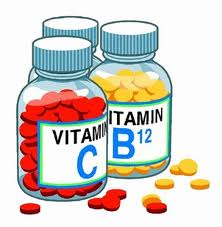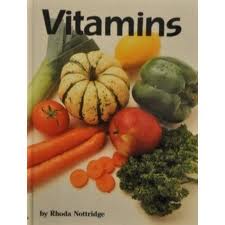Vitamins
- 5 Nutrients That Are Affected After the Gastric Bypass
- What are Vitamins
- Vitamin Deficiency
- Antioxidants Vitamins
- Vitamin Supplements
- Vitamins for Kids
- Herbal Vitamins
- Liquid Vitamins
- Vitamin B Complex
- Vitamin Overdose
- Prostate Vitamins
- Anti Aging Vitamins
- Vitamin C Overdose
- Prenatal Vitamins
- Vitamin B12 Injections
- Vitamin C and Skin Care
- Vitamin C
- Vitamin B1
- Vitamin B2
- Vitamin B3
- Vitamin B5
- Vitamin B6
- Vitamin B8
- Vitamin B9
- Vitamin B12
- Choline Vitamin
- Inositol Vitamin
- Vitamin P (Bioflavonoids)
- Vitamin T
- PABA
- Vitamin A
- Vitamin D
- Vitamin E
- Vitamin K
- Glossary
- Eating Disorder in Children
Vitamins Information Online
The purpose of this site is to provide the information on various vitamins, herbs and nutritional supplements to your attention so that you may be aware of some additional tools for a healthy and happy life.
Do I really need vitamin pills?

The answer is YES. Most of us, no matter how hard we try, just can't eat a good, nutritious diet at every meal every day. We need the help vitamin and mineral supplements can give. And sometimes we need a vitamin or mineral boost to help deal with health problems and relieve symptoms.
Supplements are an easy, safe, and inexpensive way to make sure you're getting the vitamins and minerals your body has to have for optimum health. Taking supplements can improve your health now and ensure it for the future. Also, there are many herbal remedies that keeps you health as well!
How much vitamins and minerals do you really need?
Your body needs only small amounts of vitamins and minerals. But because what the body manufactures is often not enough, these must be obtained from your diet and from supplements.

Water-soluble vitamins are absorbed by the intestine and carried through the bloodstream. They are not stored in the body and must be taken daily in order to prevent deficiency.

Fat-soluble vitamins are better metabolized by your body if you take it with fat, oil, or protein in the same meal (or take your pill with this type of food). These types of vitamins are stored in the body, therefore, you do not want to take these in excessive amounts, since your body retains them and the effect can be toxic.
Vitamin Facts |
 |
There are over 50 vitamins, minerals, and amino acids that can keep you healthy and fit. Use them!
Vitamin Check |
| To see how well your vitamin is being absorbed, drop it in a glass of vinegar. If it doesn't break down in 30 minutes, try another brand. A vitamin has to break down within 20 to 30 minutes, or else it will bypass the first part of the small intestine, where most nutrients are absorbed. |
The best sources for vitamins and minerals?
A balanced diet is the most sensible way of getting a sufficient amount of these nutrients. On this site, the rich and natural sources of all nutrients are listed individually to help you choose the right foods.
Related Information on VITAMINS
Personal Training - Online Personal Training Personal Trainer Services including : Fitness Programs, Diets and Nutrition Plans!
Please see the following vitamins chart for a general information on vitamins:
| Vitamin | Benefits | Recommended Daily Allowance | Food Sources | Deficiency Symptoms |
|---|---|---|---|---|
| Vitamin A | Critical to the development of bones and teeth. Helps maintain good eyesight. Enhances the immune system. Prevents red blood cell damage. |
|
Dark green leafy vegetables, Yellow-orange vegetables and fruits, Liver, Milk, Butter | Rhodopsin deficiency, night blindness, retarded growth, skin disorders, and increased infection risk |
| Vitamin B 1 | Needed by your body to process fats, proteins and carbohydrates. B-1 also helps form the fuel your body needs to function. |
|
Wheat germ, liver, pork, whole & enriched grains, dried beans | Beriberi-muscle, weakness (including cardiac muscle), neuritis, and paralysis |
| Vitamin B 2 | Processes amino acids and fats. Also activates vitamin B-6 and folic acid. |
|
Dairy products, green leafy vegetables (like spinach), whole & enriched grains | Eye disorders and skin cracking, especially at corners of mouth |
| Vitamin B 3 | Used by your body to release energy from carbohydrates and to process alcohol. |
|
Meat, poultry, fish, nuts, whole & enriched grains, dried beans | Pellagra-diarrhea, dermatitis, and mental disturbance |
| Vitamin B5 | Converts nutrients into energy. Also essential for processing fats. |
|
Lean meats, whole grains, legumes | Tingling hands and feet, loss of appetite, nausea, abdominal pain, fatigue, insomnia, reduced resistance to infection |
| Vitamin B 6 |
The principle vitamin for processing amino acids. Also helps convert nutrients into energy. |
|
Fish, poultry, lean meats, whole grains | Dermatitis, retarded growth, and nausea |
| Vitamin B 12 |
Maintains healthy nervous system and assists with blood cell formation. |
|
Liver, lean meat, fish and poultry, eggs, dairy products | Pernicious anemia and nervous system disorders |
| Vitamin B 9 - Folic Acid | Assists the normal development of cells, especially during pregnancy. Also protects your body from amino acids linked to heart disease and stroke. |
|
Green leafy vegetables (like spinach), liver, dried beans | Macrocytic anemia (enlarged red blood cells) |
| Vitamin C | Helps the formation of scar tissue, Fights bacterial infection, Reduces the impact of some allergy producing substances, Helps prevent the common cold (Controversial), As an antioxidant, fights cancer, cataracts, and heart disease. |
|
Citrus fruits, melon, berries, vegetables; like Broccoli, Tomatos, Oranges, Grapefruit, Cantaloupe | Scurvey-defective bone formation and poor wound healing |
| Vitamin D | Critical for bone development and strength, Mantains a stable nervous system, Maintains a normal and strong heartbeat, Helps in blood clotting. |
|
Fish-liver oils, Fortified milk, Egg yolks, Tuna fish | Rickets-poorly developed, weak bones; osteomalacia; bone resorption |
| Vitamin E | Lessens oxidative damage after hard training, Prevents lung damage from many pollutants, Vital to the immune system. |
|
Vegetable oils, Wheat germ, Whole grains, Rice, Leafy vegetables | Muscular dystrophy and sterility |
| Vitamin K | Essential to blood clotting. |
|
Green leafy vegetables, Vegetable oils, Fish | Excessive bleeding due to retarded blood clotting |
Happy healthy living to you!

